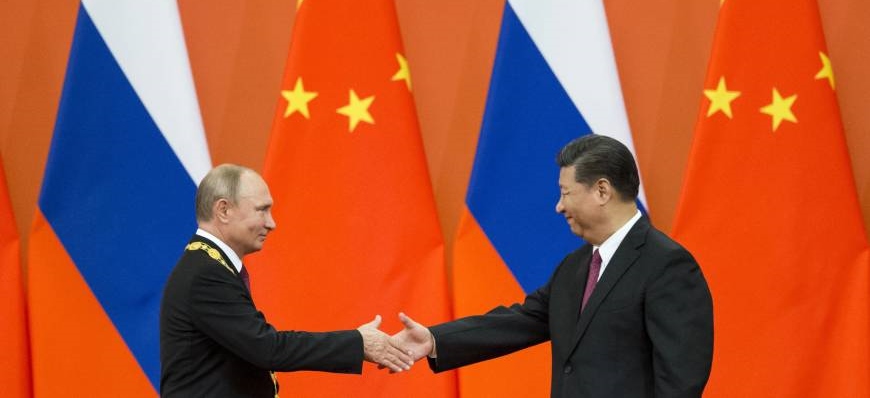Xi-Putin relationship continues to trump
July 19, 2018 | Expert Insights

Following the Helsinki summit, China’s foreign ministry welcomed improved US-Russian relations. A spokeswoman said Beijing was “full of confidence” about its own ties with Moscow.
The Chinese government and analysts believe that China-Russia relations will not be affected by any external factors.
Background
China and Russia have had a somewhat tumultuous past. From former allies to bitter rivals throughout the 60s and 70s despite both being led by communist governments and finally back to allies again in the 90s. Both nations, despite not having a great deal in common culturally, nonetheless find themselves politically in agreement on a large number of key issues on the global stage, often offering a viewpoint that is opposed to those offered by their American or European contemporaries.
While there is a great deal of political good will between the two nations, that has not yet translated into strong economic ties, with Russia only accounting for around 1.8% of China’s global exports and Russian goods, primarily energy, making up only 2% of China’s imports from Russia. However, with Russia’s participation in the OBOR mega-project that is being spearheaded by China, there is a chance that the warm political relations between the two may soon be backed up by a vastly increased amount of bilateral trade.
China and Russia have recently coordinated on many aspects of foreign policy, such as supporting the Assad regime in Syria, criticizing the handling of the Korean Peninsula crisis by the United States and, the U.S. decision to recognize Jerusalem as the capital of Israel. As both are permanent members of the United Nations Security Council, combined they have a great deal of power when it comes to organizing or preventing any action by the international community.
However,Sino-Russian relations are closer than they have been at any time in the past fifty years. Chinese president Xi Jinping described the relationship between China and Russia as the "best time in history", saying the two nations are each other's most trustworthy strategic partners.
Analysis
The bonhomie fostered between President Trump and Mr.Putin in the Helsinki meeting drew appreciation from the Chinese.“China welcomes the improvement of Russia-U.S. relations,” Foreign Ministry spokeswoman Hua Chunying said. “We hope that the two sides will step up communication and expand cooperation,” she added.
Trump touted his meeting with Putin in Helsinki as a major step towards rehabilitating ties between the two nuclear powers.But the meeting drew bipartisan rebuke for Trump after he failed to condemn Putin for the 2016 election interference and blamed the United States for the poor relationship between the two sides. Following the criticisms back home, Trump backtracked his earlier support for Putin and said that he misspoke in Helsinki.
With Sino-US relations being on the edge lately due to the trade war and China’s new found economic relationship with their European counterparts while Trump continues to look at EU as a ‘foe’ has lead to volatility in the international arena. However, Chinese experts continue to believe that the Helsinki meeting will not significantly influence China-Russia relations.
"It is necessary for Putin and Trump to talk about China, because China is important. But it does not mean that Russia and the US are seeking ways to confront China," Li Haidong ,professor at the Institute of International Relations in Beijing said.
According to Li Haidong, the US president "is confident in simultaneously befriending China and Russia, although it is different from the traditional and ruling ideology supported by the US establishment elites and media.” "For Putin and Russia, China is still a more active and effective partner," he added.
“Trump has made clear that he is a big fan of Putin,” said Li Xin, director of the Russia centre at the Shanghai Institute of Foreign Studies. “But everyone knows that Trump frequently changes his mind.“His attempts to be friendly cannot compete with the history and the intimacy of Xi and Putin’s relationship.”
Moscow and Beijing are linked symbiotically by practical and political needs.China wants Russian oil and gas to power the world’s second-largest economy. Moscow needs Chinese trade and investment more than ever following its estrangement from the West over its 2014 annexation of Crimea. And they share a mutual loathing of Islamic radicalism in Central Asia and resent US global dominance.
Counterpoint
Political commentator, Harry Kazianis suggested,“Yet there is the remote possibility Washington and Moscow might one day feel the need to unite against China if its rising influence tramples their interests.”
“While we might rightly see Moscow as a rogue nation today, tomorrow it could be a partner in containing a common foe,” Kazianis wrote in The American Conservative.
Assessment
Our assessment is that the Helsinki meeting would not lead to any major structural changes in the US policy towards Russia as Trump continues to face domestic pressure and criticism. We believe that China’s relations with Russia has an optimistic future due to their mutual political and economic interests. We feel that it is highly unlikely for US and Russia to unite against China in the near future.








Comments